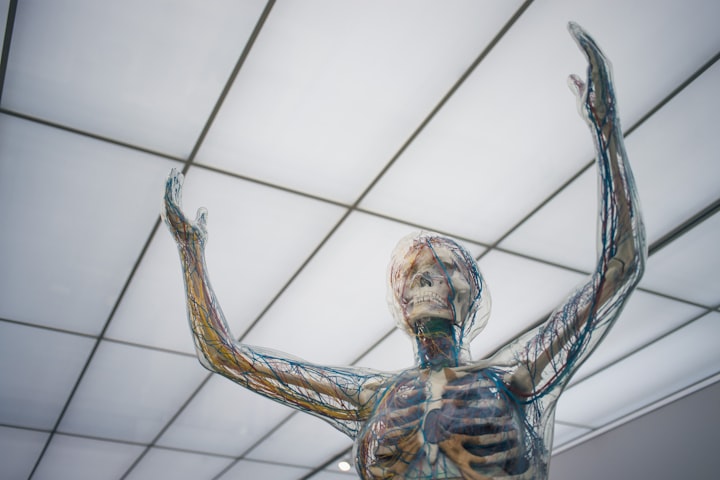The Hilarious & Heartbreaking History of the Nervous System (& Why It's Relevant Today)
It's been a fascinating tale that's spanned millennia. Come and meet the people who are responsible for what we know and love today

The history of the nervous is a fascinating tale of East meets West. In our quest to understand the body, mind, and spirit, the nervous system has been a curious exploration across many different cultures throughout millennia.
Perhaps one of the biggest driving forces in wanting to understand the human experience has been through trying to understand pain. I consider us very lucky today, for example, not to have to go through dental work or surgery without anaesthesia because the alternative doesn't bear thinking about. However, for our ancestors that had no other choice, it must have warranted coming up with an alternative a helluva lot! And luckily for us, there were a lot of people who did just that.
Some of those early humans can be traced back to Egypt and Greece. After all, the word nerve derives from the Greek word neùron sinew. So, it's safe to assume that the Greeks were among some of the first adventures to begin the difficult task of trying to understand the human body.
When it came down to what the nervous system was and where it originates, however, there were three main opinions:
- It originated in the brain
- It originated in the heart
- It was controlled by the spirits
Now, if that last one sounds crazy to you, firstly where is your compassion? And secondly, remember that at the time the church was in full swing and many people believed in God or some other higher power. They also believed that pain, suffering, and bad luck must be a sign that the spirits were not happy. So, naturally, that's where they thought the nervous system resided.
The West often referred to this as the devil's work if pain or bad luck fell onto them or God's work if it was done to an enemy. The East was a little bit more compassionate with their reasoning and simply called it bad karma for both.
Whatever it was labelled, one thing was for sure and that was that many people believed that spirits controlled the nervous system. This, naturally, persuaded them to pray, repent, and beg for mercy a lot.
However, not everyone had the same beliefs. Some were a little more rational than that.
One of those was Aristotle - the Greek philosopher in the fourth century B.C. - who believed that nerves were controlled by and originated in the heart. He reckoned that because the heart was the first organ in the body and the seat of all motion and sensation, it must originate there.
This sparked a furious debate that spanned centuries and included philosophers, thinkers, artists, and scientists alike, with each one trying to prove and disprove his theory.
Not long after Aristotle came Alcmaeon of Croton, Praxagoras of Kos, and Herophilus of Chalcedon - three ancient Greek philosophers in the 5th century. They were among the first to relate the head to the body which I know it sounds obvious now but back then, it was a big breakthrough.
Alcmaeon argued that the brain is the seat of intelligence that connects to the extremities of the body. Praxagoras suggested that the brain controls movement in the body and proposed the existence of what we now call neurons. He suggested these neurons send messages from the brain to the rest of the body which is a theory that still holds up today.
Herophilus, on the other hand, wanted hard proof so he used dissection, showing that nerves connect to internal organs and muscles, further adding to the two men before him.
Five centuries after that, a Roman physician called Galen contradicted Aristotle by concluding that the brain (not the heart) was the most important organ of the body, saying that all nerves must emanate from there.
If Alcmaeon, Praxagoras, and Herophilius were still alive, they would have been very proud and supportive of Galen, I'm sure. And if those spirit-believing folk are correct, they would have been cheering him on even if they weren't!
A big part of Galen's thinking was that he saw the spinal cord as an extension of the brain which carried sensations to the limbs, in much the same way Alcmaeon and Praxagoras did. However, he went one step further by differentiating nerves into two categories: hard and soft.
An Islamic medical philosopher called Avicenna then agreed with Galen but added a lovely description - "white, soft, pliant, difficult to tear". He also gave a rather poetic texture to nerves in association with anger: "Dryness in the nerves is the state which follows anger."
Not content with Galen's vocabulary, Master Nicolaus then chimed in by rather unashamedly renaming hard and soft nerves into sensory and motor, two words that are far more familiar today.
He is also recorded as saying, "there are also five kinds of sensory nerves, which are classified according to the operations of the five senses, namely, sight, hearing, smell, taste, and touch."
Even Leonardo Di Vinci (1452–1519) weighed in with an opinion, proudly proclaiming that the medulla (the lowest part of the brain and the lowest portion of the brainstem) is the source of nerves that give voluntary motion to the body. Considering how accurate this is today, it was a remarkable feat at the time of writing.
However, all of this scientific talk was still a bunch of nonsense to those were believed firmly in the spirit world, and they weren't ready to give up the fight so easily.
Descartes - a French philosopher from 1596 to 1650 - had been researching and writing papers on it for over 20 years and in 1664, he published his findings.
Unfortunately, he might have been a few centuries too late because there was already too much evidence stacking up against him and too much science suggesting otherwise. So, his theory slowly lost traction if it ever gained any in the first place.
And then came the English (I bet you were wondering how that was gonna take?)
Cue William Harvey…
William Harvey was an English physician who was around at the same time as Descartes from 1578 to 1657. He somewhat ignored Descartes altogether when he wrote: "According to Avicenna, the nerves are like plantings of the brain, and provide ready intelligence for the organs of sensation; like the fingers of the hand; wherefore the brain neither sees or hears yet knows all things."
I particularly love that last line - "the brain neither sees nor hears yet knows all things."
However much science was stacking up, however, the ongoing bickering continued for another two centuries. That was until Charles Bell and Francois Magendie discovered between 1811 and 1824 that the ventral roots in the spine transmit motor impulses and the posterior roots receive sensory input. (This must have made Master Nicolas cheer in his grave!)
Together, they found this out through dissection and vivisection (which, unfortunately, is the practice of operating on live animals). It saddens me to think about it now, but their findings gave the world hard proof. It also dampened once and for all any last hopes for those still rooted in Descartes' camp.
Roll into the 1900's and major breakthroughs had begun to mount up through technological advancements.
"It is difficult to believe that until approximately the year 1900 it was not known that neurons are the basic units of the brain. Equally surprising is the fact that the concept of chemical transmission in the brain was not known until around 1930." - Michael Nikoletseas
By the 1900's, knowledge of the nervous system had firmly entered the mainstream. So much so, that James Joyce famously coined the term "You're getting on my nerves" in his book Ulysses in 1922.
From then on, it's been a long and rich exploration into all the different areas of the nervous system, with discoveries, tests, experiments, and findings still very much active and present today.
So, now we're up to date, let's look at what we know about the nervous system today, shall we?
Today
Today, it's widely agreed that the nervous system is divided into two parts. The central nervous system (CNS) and the peripheral nervous system (PNS). The central nervous system is located in the skull and vertebral canal of the spine (Leonardi Da Vinci would be proud), and it includes the brain and spinal cord (Alcmaeon, Praxagoras, Herophilius, and Galen would be proud too).
All remaining nerves in other parts of the body are part of the peripheral nervous system (PNS). For time and ease, I will continue to speak of the central nervous system and the peripheral nervous system in their abbreviated forms - CNS and PNS as I'm sure it's less of a mouth full for you as much as it is for me.
The PNS consists mainly of nerves which are enclosed bundles of long fibres that connect the CNS to every other part of the body. Nerves that transmit signals from the brain are called motor neurons while those nerves that transmit information from the body back to the CNS are called sensory nerves.
The nerves in the spinal cord serve both functions which could have been the source of inspiration for Socrates to say, "If you would seek health, first look to the spine."
The PNS is then further subdivided into three separate subsystems: the somatic, autonomic, and enteric nervous systems.
Somatic nerves mediate voluntary movement (moving the head, arms, legs, etc…). The autonomic nervous system is then (stay with me) further subdivided into the sympathetic and the parasympathetic nervous systems. While the enteric nervous system controls our gastrointestinal system or gut. Both the autonomic and enteric nervous systems have involuntarily functions (heartbeat, breathing, and digestion) whereas the somatic is not. That's the big difference.
At a cellular level, the nervous system is defined by the presence of a special type of cell, called the neuron, also known as a "nerve cell." (If James Joyce was being really clever, he would have coined the term "You're getting on my neurons" instead. But as history is history, we can't go back now.)
Neurons have special structures that allow them to send incredibly speedy signals to other cells. They send these signals in the form of electrochemical impulses traveling along thin fibres (similar to that of cable fibre we use in our homes).
They are then directly transmitted to neighbouring cells through electrical synapses or chemical synapses that cause chemicals called neurotransmitters (serotonin, dopamine, etc…) to be released. A cell that receives a synaptic signal from a neuron can get excited and aroused or be inhibited depending on previous experiences, traumas, etc…
These neurons form neural pathways and neural circuits that shape our entire reality, from the beliefs we believe, the biases we carry, and the limitations we experience.
When it comes to understanding all of this in more day-to-day terminology, we need to look no further than the autonomic nervous system. So, let's look at that now.
The two sides of the autonomic nervous system
The autonomic nervous system is made up of two parts: The sympathetic nervous system and the parasympathetic nervous system.
The sympathetic nervous system controls our stress response, better known as our fight or flight response. It also monitors the body's temperature, controls saliva levels, inhibits digestion, accelerates heart rate, dilates pupils, constricts blood vessels, raises blood pressure & perspiration (heat and sweat), and creates goose pimples which combined, make the body alert, sharp, and focused. It is also associated with cognitive and analytical thinking.
The parasympathetic nervous system, on the other hand, is better known for being our rest and digest response. It also helps to restore balance, slows and stabilises a resting heart rate, promotes digestion, improves recovery/healing time, produces saliva, and boosts the immune, digestive, and cardiovascular systems. It is also associated with creativity and intuition.
The heart/brain/breath connection
As we breathe in our diaphragm flattens, our lungs expand, and our heart contracts. This sends an incredibly speedy message up to the brain that then sends an incredibly speedy message back to the heart that says, "you must speed up", so it does. Then as we breathe out the reverse is true. Our diaphragm lifts, our lungs compress, and our heart opens. This sends an incredibly speedy message up to the brain that then sends an incredibly speedy message back to the heart that says, "you must slow down", so it does. Whatever messages are sent thereafter create the thoughts that we think, the emotions that we feel, and the actions we take.
The body has developed this incredibly fast response mechanism because it knows if the breath ever stops, so does it. So, it knows that it must relay exactly what the breath is communicating to let the heart and brain know as quickly as possible.
Therefore, every breath that we breathe carries a message, but we are the ones who deliver it through the way we are breathing.
Stress in the body
On a physiological level, the nervous system reacts to both positive and negative stress in the same way. Good stress such as exercise, ice baths, cold water, saunas, breathwork, etc… create a positive stress response while bad stress such as a heated argument, violence, anxiety, etc… creates a negative stress response.
A lot of people are breathing stress into their bodies these days without knowing how or why and they're living with the consequences because of it.
The effects of stress on the body:
- Heart rate increases
- Blood circulation quickens
- Oxygen levels rise
- Pupils dilate
- Focus narrows
- Diaphragm engages
- Adrenaline & cortisol get released
- The body becomes more tense and alert
- (Only positive stress response) - Dopamine, oxytocin & serotonin (the 'happy' chemicals) get released
As you can see the only difference between a negative stress response and a positive one is that the 'happy chemicals' of dopamine, oxytocin, and serotonin are released. However, knowing how the nervous system communicates with the heart, brain, and every cell in the body makes the world of difference.
That's why exercise feels so great but why emotionally toxic environments feel so terrible. The nervous system is responding to what is happening in the same way but without any kind of reward. Instead, it's flooded with adrenaline and cortisol and put under more stress than it can handle because it thinks it's in real danger. And exactly because it thinks it's in real danger, it is, but only from itself.
This is extremely helpful in dangerous situations but very damaging in day-to-day life. The outrageously high levels of stress, anxiety, depression, and mental illness in the modern world are proof that we have collectively been living out of balance for some time now. This can then make it easy for certain people to turn to their addictive habits such as smoking, overeating, TV, gaming, gambling, alcohol, social media, drugs, pornography, sex, etc… to get a reward from the environment that's otherwise lacking.
And once a reward has been associated with an action, neural pathways in the brain fire and wire together to tell the body to do whatever it just did, so it often will. That's why habits are so hard to break. We're literally fighting a chemical and biological impulse that drives us towards the very thoughts, emotions, desires, and cravings that we're trying so hard to forget.
But (and it's a big but) the same chemical and biological impulses are responsible for driving us towards all habits, both good and bad. So, if our daily habits support a healthy lifestyle and the body feels good doing them, it will naturally seek to do them again.
Our only job then is to direct the body towards these experiences.
Creating a healthy environment
Our environment, both the one we create internally and externally either supports the nervous system or doesn't. And everything matters.
If our external environment is filled with people that put us down, for example, or who are violent, negative, and judgemental, who eat junk food, listen to loud music, and are generally unsupportive and disinterested, there's a much bigger chance that our nervous system will be on high alert at best, and completely frazzled at worst.
If, on the other hand, we're surrounded by kind, loving, supportive people that encourage us, that think positively, eat healthy, nutritious food, are connected to nature and are naturally calm and relaxed, we will typically find that our nervous system will be more relaxed as a result.
I don't make this comparison to favour one way over the other but rather to highlight how the nervous system responds to each environment. My goal here isn't to judge or condemn anyone for what they do in life. That would be hypocritical of me, to say the least. After all, I love listening to my old favoruite Jamie T, eating a Cadbury's dairy milk chocolate bar, drinking a cold beer, and feeding my obsession with Formula 1 so I get it. So, this isn't to judge any of the above lifestyle choices a person makes but rather to show how the nervous system responds to the different environments it's subjected to.
It's only by knowing what happens on a physiological and biochemical level can we use tools like breathing exercises to support the nervous system whenever we feel unbalanced.
---
If you've been inspired by the power of the breath, follow the link below to learn more about four breathing habits that can support a healthy life.
The Importance of Breathing Correctly
Or alternatively, discover my favourite breathwork techqniue here
About the Creator
Andy Murphy
Writer & Soma Breath faciliatator






Comments
There are no comments for this story
Be the first to respond and start the conversation.